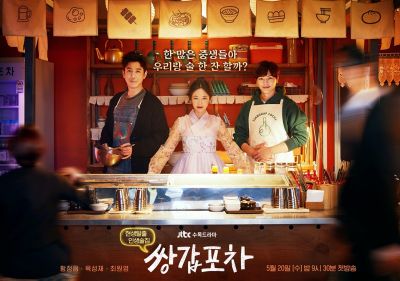‘Til I’m Gathered Safely In
Mystic Pop-up Bar
By Ha Yoon-Ah & Jeon Chang-Geun

23 Sep, 2020
Written by Ha Yoon-ah and directed by Jeon Chang-geun, 2020’s Mystic Pop-up Bar (Ssanggabpocha) is the South Korean television adaption of Bae Hye-soo’s webtoon Twin Tops Bar. It stars Hwang Jung-eum, Yook Sung-jae, and Choi Won-young.
Han Kang-bae (Yook Sung-jae) is, through no fault of his own, an outcast. Left in an orphanage as a child and rejected by every potential foster parent, he is a hard-working young man with few friends. His troubles are thanks to an unwanted gift: anyone who touches Kang-bae becomes embarrassingly frank about their inner thoughts. Unable to control this ability, Kang-bae assiduously avoids contact with other people. They in turn dismiss him as creepy.
Weol-ju (Hwang Jung-eum) does not see Kang-bae as creepy. She sees him as a potentially valuable asset in her quest to settle 100,000 grudges lest she be consigned to the Hell of Extinction.
Five centuries before, Weol-ju was, like her mother, a talented shaman. When Crown Prince Yi-hon fell ill, she healed him. This led to a passionate but forbidden love affair between the two. Targeted for assassination, Weol-ju survived because the killer mistakenly murdered her mother instead. When justice seemed out of her reach, Weol-ju hanged herself.
Alas for Weol-ju in particular and Korea in general, she hanged herself from the Sacred Tree. The Sacred Tree lost its powers and as a result, 100,000 people died in a bloody conflict. God of the Underworld Yeomradaewang could simply consign Weol-ju to annihilation. Instead Weol-ju is given a slender hope: if she can use her abilities to minister to 100,000 unhappy people, she will be allowed rebirth.
This project has not gone entirely well. Despite the assistance of former afterlife policeman Gwi (Choi Won-young), an increasingly grumpy Weol-ju has yet to meet her quota. Inexplicably, strangers do not want to confide in the quietly fuming pop up bar owner. Her deadline is but a month away and while she won an earlier extension, there will be no second extension. Failure means the Hell of Extinction.
When she learns of Kang-bae’s curse, Weol-ju sees the solution to her problem. Simply bully Kang-bae into working for her in exchange for an eventual cure for his curse, and the young man can induce frankness in customers. This in turn will allow Weol-ju to help the last few people she needs to reach 100,000. Everyone wins!
But one evil spirit is determined to prevent Weol-ju’s success at all costs.
~oOo~
The afterlife in this work is an odd combination of inflexibility and easy-going informality. On the one hand, there are firmly delineated punishments for transgressions. On the other, there are surprising number of loopholes. On the one hand, the judges of the afterlife are terrifying nigh-gods. On the other, one can conceivably drop in on the god of fertility for a chat, and a senior celestial official might be a regular at a local bar. One also gets the impression that some of the more contrived traditions were introduced to give the poor mortals a shot of escaping the consequences of lapses in judgment.
This series begins as a grudge-of-the-week saga, in which the trio (Weol-ju, Gwi, and Kang-bae) become aware that a customer has a problem and fumble their way towards a solution. This is amusing enough and no doubt could have been provided plots for dozens and dozens of episodes.
This early format is complicated by a meet-cute with action-girl Kang Yeo-rin (Jung Da-eun), the only living human immune to Kang-bae’s curse. It just so happens that her curse cancels out his1. You may wonder just how romantically inept two self-isolating people might be. The answer is “very.”
This series wasn’t intended to run indefinitely, so open-ended adventures aren’t part of the scenario. We learn that all of the characters are part of a half-millennia-old story which will reach a conclusion as the series ends. The first episodes are comic; as the end approaches, the tone shifts. The grudge of the week gets back-burnered in favour of an increasingly high-stakes struggle between Weol-ju and her great adversary.
None of which would matter if the cast weren’t fun to watch. I liked the central trio; I enjoyed their interactions. Thumbs up.
Mystic Pop-up Bar is available on Netflix.
1: “Just so” in the sense that nothing in this is coincidental.
